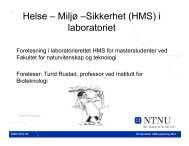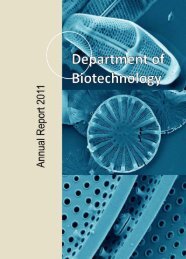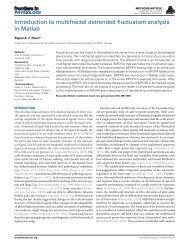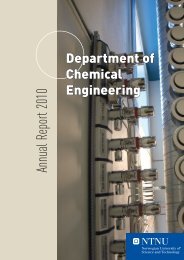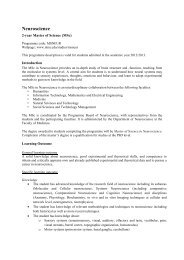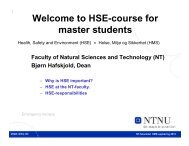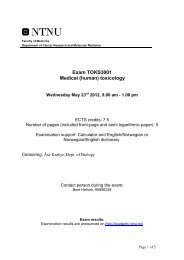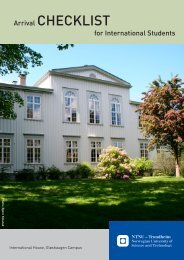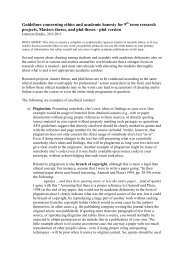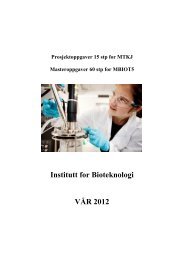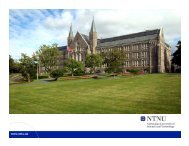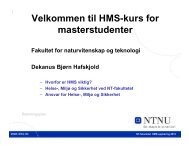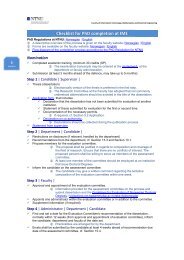Annual Report 2011 - NTNU
Annual Report 2011 - NTNU
Annual Report 2011 - NTNU
You also want an ePaper? Increase the reach of your titles
YUMPU automatically turns print PDFs into web optimized ePapers that Google loves.
PAGE 2<br />
<strong>NTNU</strong> GLOBAL<br />
Seminar: Global Operations and Challenges<br />
On the 18th November, <strong>2011</strong>, the<br />
Globalization Focus Area, Global Production<br />
and Communication (GP&C)<br />
organized a seminar entitled “Global<br />
operations and challenges of operating<br />
internationally” that was held at <strong>NTNU</strong><br />
Gløshaugen campus.<br />
The event which was organized in collaboration<br />
with the Department of Industrial<br />
Economics and Technology<br />
Management (IØT) and SINTEF’s<br />
MARGIN project, CRI Norman and<br />
the SMARTLOG network attracted<br />
over 50 participants who included researchers,<br />
practitioners and students.<br />
Arne Otto Flataas (left), Professor L. de Boer (centre), Dr. M. Mol and G. Mugurusi (right)<br />
in discussion<br />
Dr. Michael Mol (above), an accomplished<br />
strategy and international business<br />
scholar from Warwick Business<br />
School (UK) was the key note speaker<br />
at the event, where researchers including<br />
Godfrey Mugurusi (<strong>NTNU</strong>), Marco<br />
Semini (SINTEF) shared experiences<br />
and research.<br />
Industry executives Arne Otto Flataas<br />
(Kongsberg Maritime) and Ståle Sæther<br />
(Aqualine) shared practices, successes<br />
and challenges involved when companies<br />
operate and deal with suppliers,<br />
customers that span across the globe.<br />
Dr. Mol was sceptical of ways companies<br />
operate in a global paradigm, describing<br />
this as “a messy reality than<br />
facts actually tell us” but was swift to<br />
propose a structured (not a recipe) approach<br />
on how they could go about the<br />
international operations in a more processual<br />
way.<br />
Godfrey also presented his PhD work<br />
that draws inspiration from the “viable<br />
systems model” to understand how<br />
globally dispersed companies go about<br />
the process of “offshoring” but also<br />
how they organise and coordinate their<br />
operations especially purchasing activities.<br />
Marco Semini presented SINTEF’s<br />
work with numerous Norwegian companies<br />
and emphasised how these companies<br />
leveraged their internal capabilities<br />
in the global market to remain<br />
competitive in both the short and longterm.<br />
Marco went on to highlight two<br />
key points for companies: one, that<br />
what, why and how companies offshore<br />
and how they carry out global<br />
operations differs, and two, that competitive<br />
solutions depended on product,<br />
market and industry characteristics.<br />
From industry, Arne Otto Flataas from<br />
Kongsberg Maritime shared some of<br />
the company’s successes and challenges<br />
with their offshore operations in China<br />
(Zhenjiang, Jiangsu) and Korea<br />
(Busan). Arne’s presentation emphasised<br />
the importance of having a good<br />
human resource function and the fact<br />
that while china offers big opportunities<br />
for growth, customs bureaucracy<br />
and cultural differences pose a huge<br />
problem to achieving that growth.<br />
Ståle Sæther from Aqualine, a company<br />
that designs and installs floating fish<br />
farming cages and mooring systems,<br />
emphasised the role of coordinated<br />
shipping in their operations and quality<br />
as key starting point for each unique<br />
customer project. The biggest challenge<br />
for Aqualine was coordinating the<br />
whole operation from Norway, yet<br />
sourcing system components from all<br />
over the world. This, Ståle observed,<br />
had extensive challenges to the company’s<br />
just-in- time principle, especially<br />
when production stopped because only<br />
a single component was missing.<br />
The event concluded after parallel discussions<br />
where companies shared these<br />
challenges in more detail with participants<br />
in order to map out possible solutions.<br />
A common message from the two<br />
companies, ‘learning by doing’ left a big<br />
impression to the participants.<br />
In closing the seminar, Professor<br />
Luitzen de Boer, the event’s moderator<br />
mooted the need for companies to seek<br />
more synergies with researchers and<br />
always attend such knowledge sharing<br />
workshops when invited.<br />
This was the fourth in series of seminars<br />
organised with funding and support<br />
from <strong>NTNU</strong>’s Globalisation Research<br />
Programme, IØT and SINTEF<br />
collaboration and once again, it was a<br />
great success!



